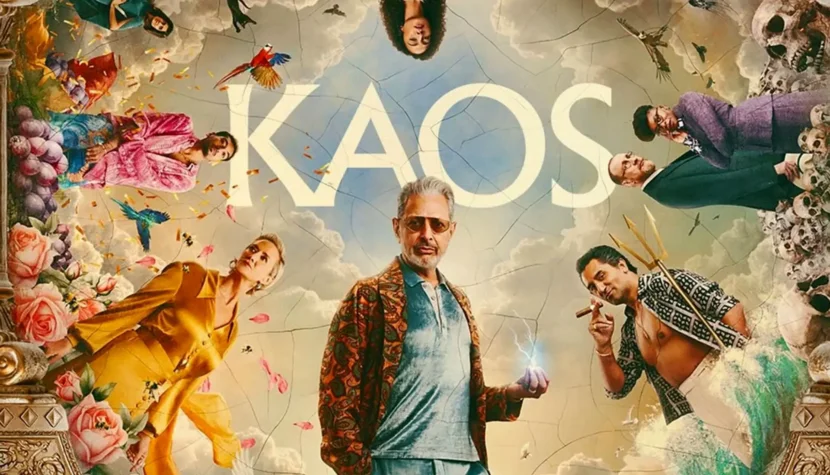KAOS. The World of GODS Not for Mortals [REVIEW]

The gods have landed on Netflix in the form of the comedy-fantasy series “Kaos”, written by Charlie Covell. To be precise, the Greek gods, who were foundational to later imperial Roman and post-Roman culture, along with the Roman and Egyptian deities, gave rise to all other “Western” gods. It’s a pity our Slavic gods didn’t make the cut, but unfortunately, Mieszko I gave them a bad PR with his baptism. The trunk is, however, one, and the series “Kaos” tells the story of its disintegration, driven by the gods and their devoted acolytes. The metaphor is skillfully crafted, modern, reinterpreting symbols we know from school and giving them logical, though entirely unexpected, relevance in the lives of us 21st-century consumers of pop culture. So I wouldn’t recommend this production to people who are “classically” devout or, even more so, to the ideologically sensitive, who might be struck by Zeus’s lightning in the form of a black Persephone or Dionysus, who, like many ancient Greeks, enjoys the company of male genitals, especially in club bathrooms.

Indeed, all these serious metaphors are presented to the audience in a humorous way. This humor is more bitterly satirical than outright slapstick. Generally, the character around whom everything revolves is Zeus (Jeff Goldblum). He’s a real scoundrel, like most gods. But times are changing, and people are becoming increasingly happy. Unfortunately, Zeus notices this during one of his “reproductive” trips to Earth. The chief god feels himself weakening and tries to do everything to return to the good old days when people were more fearful, knew less, and their pain was eased by simple faith in myths. But how can this be done when even among the divine members of the thunder god’s family, divinity itself has taken a backseat to the more mundane aspects of life? The experienced guide leading viewers through the plot is Prometheus, whom Zeus considers his “best friend,” and occasionally unchains him from the rock to take him to his ultra-rich residence to seek advice on how to torment the overly happy mortals. And then there’s Orpheus, the hopeless romantic, willing to do anything for his Eurydice, who is trapped in the underworld, even though she no longer loves him and wanted to leave him before she died. In “Kaos”, myth literally merges with reality as if it grew out of it, which is actually true, but somehow the narrative presented to us in culture never depicted this connection so skillfully in literary terms. This was deliberate, as the division between the real world and the supernatural world, which is the goal, fostered the discipline of worshippers. The blending here is thematically brilliant, and I envy the minds of Charlie Covell and Georgia Christou for being able to come up with something like this. Returning to the bitter satire, the creators of the series wanted to convey something important to the audience in this light form.

They certainly wanted to encourage viewers to take on the undoubtedly difficult challenge of looking at the world more soberly than the surrounding majority believes. So, you’re up against not only your own mind and learned reactions but also others, often close to you. The only path to cultural freedom is rebellion against every form of sanctity, symbolized by the inscription that so outraged Zeus: “Fuck the gods.” Now imagine not just someone painting that in singular form with excrement on the Temple of Divine Providence but covering all of Jerusalem with it. We are still at a civilizational point where we occupy the place of the gods, imagining, assuming, of course, their undeniable existence, that such inscriptions would even bother them at all, even in Jerusalem—given how they have revealed themselves so far in human history. “Kaos” is a series about how to free yourself from this kind of magical thinking because there is nothing worse for the gods than fervent worshippers who blow themselves up, rape, and murder in their name, or endlessly talk about blasphemies. All these are human categories, human visions of divinity, which have obscured the essentially human nature of the gods. There’s a conversation between Zeus and Prometheus where the ruler of Olympus says what needs to be done for people to start being afraid again, and thus believe, because that’s automatic. In the Middle East, they are still afraid. In the West, only occasionally. “Kaos” is coming because when the last myths fall, an apocalyptic disorder won’t begin. The meaning of the word “chaos” is entirely different. How nice it is that someone in the world of film so cleverly used the true sources of our European culture, its roots, to remind us of how much wisdom can be drawn from mythology.
That’s all for the content. The visual layer and casting choices also deserve praise. Jeff Goldblum as Zeus, David Thewlis as Hades, and Cliff Curtis portraying Poseidon. On the other hand, younger actors like Aurora Perrineau effectively keep up with the seasoned veterans. The concept of the underworld surprises with its freshness, and the voyage of the dead on a steamboat across the Styx is the best reimagining of the myth of Charon that I’ve seen so far. A solid 8/10.

